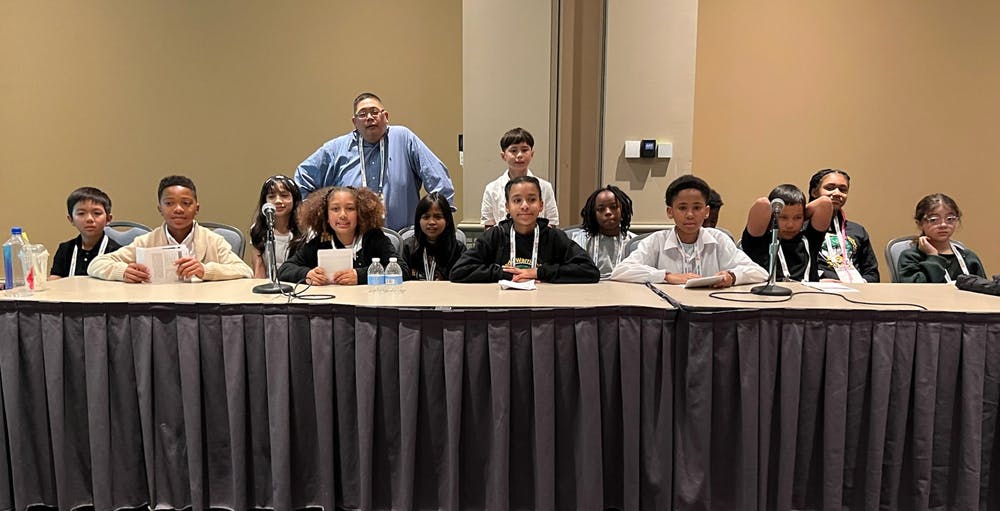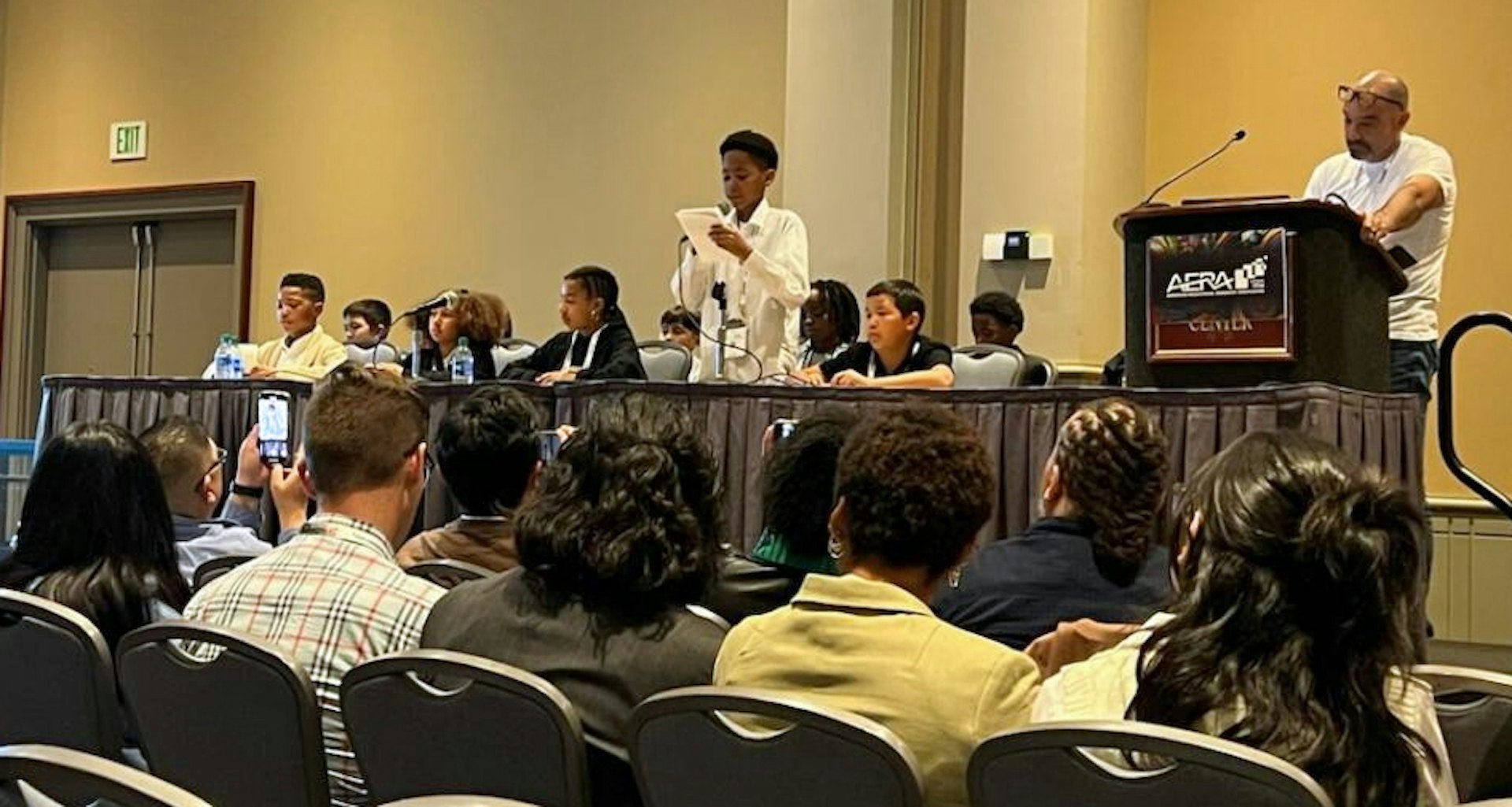TEP alumnus facilitates college-level experience, connects students with national experts on education, equity.
While thousands of students from across the nation presented their work for the first time at this year’s annual meeting of the American Educational Research Association (AERA), it is unlikely that any of them were as new to academia than a group of 13 fifth graders from the Oakland Academy of Knowledge (OAK). Led by UCLA alumnus Laurence Tan (’02, M.A., Teacher Education Program), a fifth-grade teacher at OAK, and Jeff M.R. Duncan-Andrade, professor of Latina/o Studies and Race and Resistance at San Francisco State University, the students shared their findings on “Researching the Reparations in Schools: Urban Youth as Researchers of School Quality,” in an AERA Presidential Session on April 12.
The focus of the students’ presentation was an examination of school equity, in particular, the Black Reparations Initiative implemented by the Oakland Unified School District (OUSD) in 2021, and how it has impacted OAK, the last predominantly Black elementary school in East Oakland. In preparing the students for their presentation, Tan employed a youth participatory action research project model (YPAR) and raised funds to bring the group to the conference in Philadelphia through a GoFundMe campaign. His efforts caught the attention of Oakland’s KTVU-FOX, and the station boosted contributions with an online articleand later, interviewed Tan and his students in-studio after they returned from AERA.
The students spent weeks on their research, which included reading Duncan-Andrade’s book, “Equality or Equity: Toward a Model of Community-Responsive Education,” and interviewing renowned scholars on what educational research says would make schools more equitable. In addition, they interviewed 100 community stakeholders, including students, school staff, and families, for their study.
Among the experts that Tan connected with his students were Tyrone Howard, 2023-2024 AERA president and UCLA professor of education; Gloria Ladson-Billings, the first Black woman to be tenured as a professor in the University of Wisconsin–Madison’s School of Education; and Pedro Noguera, dean of the USC Rossier School of Education. These scholars were featured in the video that the OAK students shared at AERA.
The students’ findings showed that only one other school district in California has passed such an initiative to address educational inequity for Black students, and that only 7% of U.S. teachers are Black, with 2% of them Black men. The study also revealed that although OUSD provided funding for the Black Reparations Initiative, the extent of the effort has been for select schools in the district to hire teacher on special assignment to support Black students. OAK was one of the schools selected, but to date, has not filled that position.
“As Black people, we have not actually experienced any real change in our lives,” stated the OAK students in their presentation. “We appreciate that our district acknowledges their failure to support our community, but it also feels insulting to have them own up to their failures, say they’re committed to doing something about it, and then leave us with nothing more than a piece of paper with false promises.
“Because we know something different is possible, we often wonder if the education system is even serious about giving us what we need and deserve. It seems to us that this is a will and a skill issue. Without the will, our school will never full adopt the skill. We choose to do all this work with our research because we want that to change.”
A scholar of culturally responsive teaching, Tan was a co-founder of the Roses in Concrete Charter School in Oakland, part of a small group that designed and planned the school. He also previously taught at 122ndStreet Elementary School in Los Angeles, and founded the Watts Youth Collective.
Currently, Tan also works with OUSD as a consultant with the district’s equity department on creating and implementing a 3rd grade ethnic studies curriculum pilot and serves as an adjunct in the school of education at the University of San Francisco and at Santa Clara University, teaching a course in urban education.
Tan earned his bachelor’s degree in biochemistry/cell biology and sociology, with a minor in ethnic studies, music and teacher education at UC San Diego.

UCLA TEP alumnus Laurence Tan (standing) prepared fifth graders from Oakland Academy of Knowledge to present their research at AERA in April. The students conducted a research project around a Black reparations initiative in Oakland Unified School District and its impacts on their school.
How did you introduce the idea of college-level research to fifth graders?
Laurence Tan: In my second year of teaching, I was asked to participate in John Rogers and Ernest Morrell’s summer seminar series, a six-week intensive where they take students from the more marginalized high schools [in LAUSD], and we would do youth participatory action research projects [for] at UCLA. That introduced me to the YPAR process. That was very powerful for me. It expanded what was possible in teaching and how to make things more meaningful. Every summer, not only did I come back and become a facilitator of a research group, I was bent on bringing some of my former [5th grade] students – I had them participate and help run and facilitate the groups.
After that, I thought, “Well, if they can do this in high school, I can make this doable in the fifth grade.” So, in my second or third year of teaching, back in 2004 or 2005, I had my fifth- graders do a YPAR project, and we presented it at UCLA. I always had a sprinkling of middle school, high school, and maybe a couple of elementary [students], so there was this natural mentoring pipeline. High schoolers could help the middle schoolers and middle schoolers could help the elementary [students], so it wasn’t necessarily all adult-driven.
How did you prepare your own fifth graders to present scholarly research at AERA?
Tan: Teachers have to face the constraints of schedule and time, and everyone’s scripted program has priority over everything else. I used my reading group… [students who] could already decode and read words, but that didn’t make them on grade level.
I took struggling readers, and they flourished. Was it easy? No. Were they able to do it? Obviously, not at a graduate student level, but they were able to take this complex text, understand the main ideas, make connections, and make their critiques and analysis. There is something to say about meaning and engagement. Just because they’re struggling, it doesn’t mean you [can’t] engage students in meaningful work and still tackle those literacy skills.
Some of the folks that came with us [to AERA] to support were my actual students back in L.A. [They were] able to say, “Hey, this is what we went through,” and [my fifth graders] were excited to do something outside of the box.
I often challenge the students: “Hey, this is something that is usually reserved for college folks, what do you think?” We’ve tackled Paulo Freire, the second chapter of “Pedagogy of the Oppressed.” Every time I introduce something that’s going to be far into their future [as students], they dig it. They’re like, “Yes, challenge me. Let me see what this is.”
How did your education at UCLA prepare you to give your students college-level experiences, as well as connect them with the nation’s top education scholars and experts?
The biggest thing I can say for UCLA has been the networking and the connections and the support. What drew me to the program was the social justice piece, that was number one. Number two was that there are a lot of solid faculty and folks. A lot of doors have been opened to me because of the people I’ve been able to build with at UCLA. That’s how I met Ernest Morrell, John Rogers, Jeff Duncan-Andrade, and Tyrone Howard. Tyrone has been in my corner almost from the beginning, for the last 15 years, into my teaching and starting to [present at] AERA. He has always been enticing me to come to the academy.
The work I’ve done has not gone unnoticed [by] people I would cite all the time. Last year, I got hit up by a couple of people in AERA. I’m in the middle of teaching, and they were like, “Yo, you just got a lot of love from Gloria Ladson-Billings.” I asked a couple of people what happened, and they said that [she] dropped my name: “You want real? Just look up Laurence Tan.” Geneva Gay put me in her book.
The work speaks for itself. But again, those connections [at UCLA] allowed me to give those opportunities to my students. When we say we interviewed experts, some of these are at the top of their fields. A lot of that happened during spring break. The students gave up their spring break to Zoom in, every day at 9 o’clock. One kid was Zooming in from Puerto Rico on his vacation. Even the [students] who didn’t [attend AERA] still participated. If you have meaningful work, if you have things that matter, students will rise to the occasion. We flew in on Thursday and they were up until 2:00 in the morning, so they even experienced a college all-nighter. One of the students [said], “I don’t know if I ever want to do AERA again.” But others are like, “When’s the next opportunity?”
Above: At this year’s annual meeting of the American Educational Research Association (AERA), fifth graders from Oakland Academy of Knowledge presented their research on the impacts of a reparations initiative for Black students in Oakland Unified School District, under the guidance of UCLA alumnus Laurence Tan and Jeff M.R. Duncan-Andrade, professor of Latina/o Studies and Race and Resistance at San Francisco State University (at podium).
